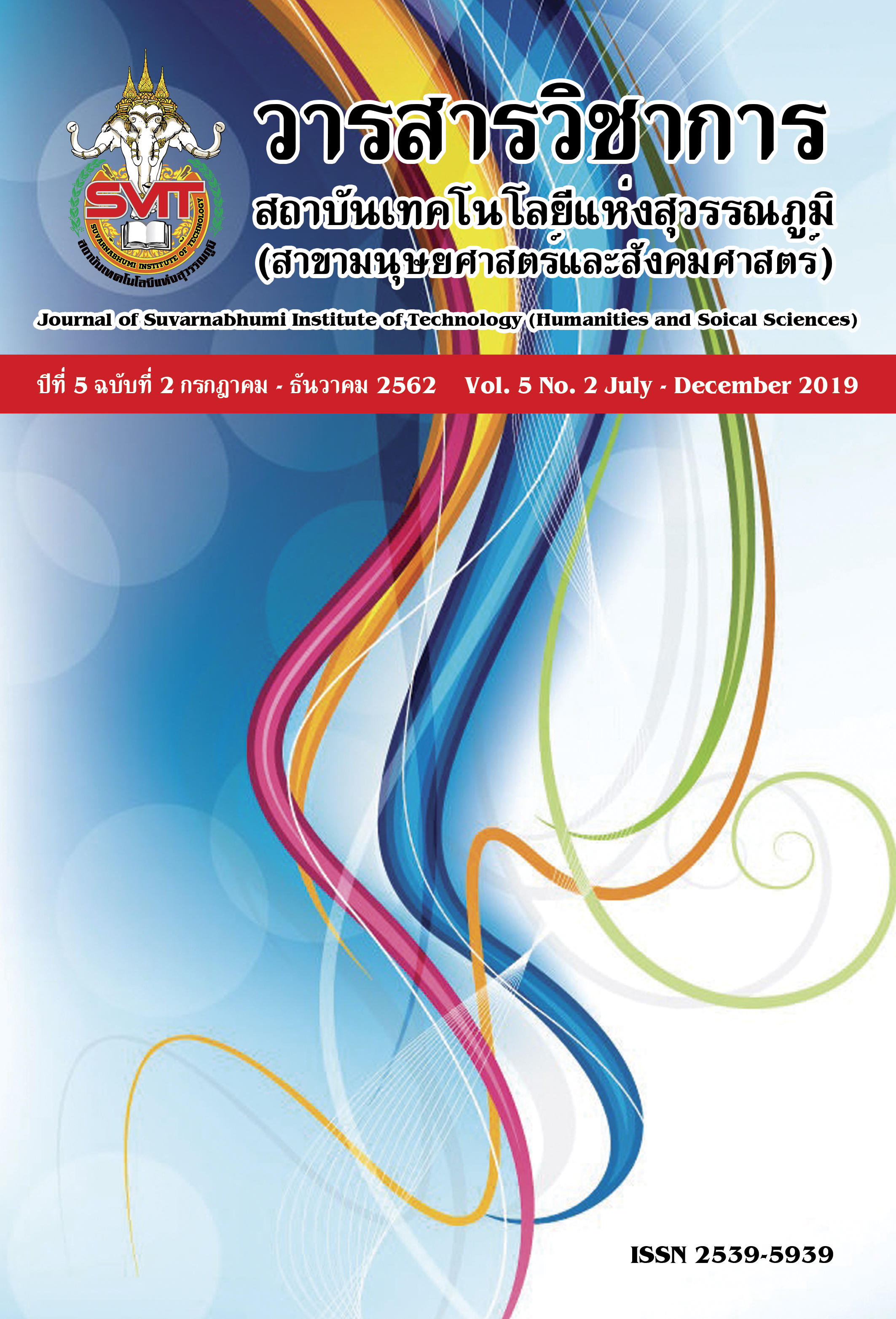LIFE SKILLS ENHANCING PROGRAM BASED ON SELF-EFFICACY CONCEPT FOR REDUCING RISKY SEXUAL BEHAVIORS OF JUNIOR HIGH SCHOOL STUDENTS
Keywords:
Program, life skills, reducing risky sexual behaviors, junior high school studentsAbstract
This study was a quasi-experimental research .The purposes of this research were 1) To develop the life skills enhancing program based on the self-efficacy concept for reducing risky sexual behaviors in junior high school students. 2) To study the effects of the life skills enhancing program based on the self-efficacy concept for reducing risky sexual behaviors of junior high school students. The sample was 70 junior high school students from Bangpleeratbomrung School, Samutprakan Province, Thailand. The subjects were studying in Grade 8 students which were divided equally into two groups, 35 students in the experimental group were assigned to participate under the life skills enhancing program and the other 35 students in control group. The experimental instruments consisted of life skills enhancing program which IOC was 0.87.The duration of experiment was six weeks. The data collecting instruments included self-efficacy about risky sexual behaviors test, risky sexual behaviors attitude test, knowledge test and risky sexual behaviors practice test. The reliability were 0.97 0.98 0.95 and 0.97 to levels.The data were then analyzed by mean, standard deviation and t – test. The research findings were as follows : 1) A developed life skills health promotion program consisted of self-efficacy and Life skills concepts, 6 interventions activities and evaluation could reducing risky sexual behaviors. 2)The effects of applying the life skills enhancing program on risky sexual behaviors in experimental group were found lower after using the life skills enhancing program than before at the .05 level of significance and lower than students in the control group at the .05 level of significance as well.
References
พรรณพิไล ศรีอาภรณ์.( 2537).การพยาบาลครอบครัววิกฤต : การตั้งครรภ์ในวัยรุ่น. ภาควิชาสูติศาสตร์และนรีเวชวิทยา คณะพยาบาลศาสตร์ มหาวิทยาลัยเชียงใหม่.
กระทรวงสาธารณสุข.( 2554). ปัญหาการตั้งครรภ์ในวัยรุ่น : บทสรุปสำหรับผู้บริหาร คณะกรรมาธิการ การสาธารณสุข วุฒิสภา.
สำนักระบาดวิทยา กรมควบคุมโรค.กระทรวงสาธารณสุข.( 2555). สถานการณ์การติดเชื้อเอชไอวีและการเจริญพันธ์ในวัยรุ่นของการมีเพศสัมพันธ์ในประเทศไทย พ.ศ.2554. นนทบุรี : สำนักระบาดวิทยา กรมควบคุมโรค.กระทรวงสาธารณสุข.
สารานุกรมทางการพยาบาลและสาธารณสุข วิทยาลัยพยาบาลพระบรมราชชนนี.(2554). ปัญหา พฤติกรรมทางเพศที่ไม่เหมาะสมของวัยรุ่น. สืบค้นเมื่อ 5 ธันวาคม 2560 จาก http ://www.bcnpy.ac.th/wiki/index.php/
สำนักอนามัยเจริญพันธ์ กรมอนามัย กระทรวงสาธารณสุข.(2557). การตั้งครรภ์ในวัยรุ่น : นโยบายแนวทางการดำเนินงานและติดตามประเมินผล (พิมพ์ครั้งที่ 2 ). นนทบุรี : กระทรวงสาธารณสุข.
สำนักงานสถิติแห่งชาติ.(2557). การสำรวจสุขภาพประชาชนไทยโดยการตรวจร่างกายครั้งที่ 5 พ.ศ. 2557.
สายฝน เอกวรางกูร. (2556). พฤติกรรมเสี่ยงทางเพศของเยาวชน.วารสารเกื้อการุณย์, 20 (2) :16-26.
บุญฤทธิ์ สุขรัตน์. (2557). การตั้งครรภ์ในวัยรุ่น : นโยบาย แนวทางการดำเนินงานและติดตามประเมินผล พิมพ์ครั้งที่ 2. นนทบุรี : สำนักอนามัยเจริญพันธ์ กรมอนามัย.
ศรีเรือน แก้วกังวาล. (2553). จิตวิทยาพัฒนาการชีวิตทุกช่วงวัย.(พิมพ์ครั้งที่ 9). กรุงเทพฯ : สำนักพิมพ์มหาวิทยาลัยธรรมศาสตร์.
สำนักงานสาธารณสุข จังหวัดสมุทรปราการ.(2560). รายงานการประชุมการป้องกันและแก้ไขปัญหาการตั้งครรภ์ในวัยรุ่น ประจำปี 2559.
Ajzen ,I. (1998). Attitudes Personality and Behavior. Chicago Illinois : The Dorsey Press.
Bandura, A. (1997) . Self-efficacy : The exercise of control. New York. Macmillan.
Johnson,L.S. Rozmer C. & Admission K.(1999). Adolescence sexuality and sexuality transmitted disease : Attitudes ,belief ,knowledge and values. Journal of Pediatric Nursing,,14(3)177-185.
Magnani.R. ( 2005). The impact of life skills education on adolescent sexual risk behaviors in KwaZula-Natal South Africa. Journal of Adolescent Health 36 : 289-304.
วันวิสาข์ บัวลอย,มณีรัตน์ ธีระวิวัฒน์,ภรณี วัฒนสมบูรณ์และนิรัตน์ อิมามี.( 2559 ). ประสิทธิผลของโปรแกรมการเรียนรู้เรื่องเพศศึกษาเพื่อป้องกันพฤติกรรมเสี่ยงต่อการมีเพศสัมพันธ์ของนักเรียนชั้นมัธยมศึกษาปี ที่ 2 จังหวัดนครปฐม.รามาธิบดีพยาบาลสาร ปีที่ 20 (1)
นรลักษณ์ เอื้อกิจ. (2552). ประสิทธิผลของโปรแกรมการพัฒนาทักษะชีวิตต่อพฤติกรรมการป้องกันการมีเพศสัมพันธ์ในวัยเรียนของนักเรียนชั้นมัธยมศึกษาปีที่ 3 โรงเรียนในสังกัดกรมสามัญศึกษา ใน เขตกรุงเทพมหานคร. วิทยานิพนธ์ปริญญาวิทยาศาสตรมหาบัณฑิต(สาธารณสุขศาสตร์) สาขาเอกการพยาบาลสาธารณ,บัณฑิตวิทยาลัย มหาวิทยาลัยมหิดล.
องค์การแพธ, (2550). แนวคิดในการออกแบบการจัดการเรียนรู้สำหรับครูและผู้ปฏิบัติงานด้านเพศศึกษา สำหรับเยาวชน. กรุงเทพฯ.เออร์เจ้นท์ แทค.
Downloads
Published
Issue
Section
License
The articles published are copyrighted by the Sarasas Journal of Humanities and Social Science. The opinions expressed in each article in this academic journal are those of the individual authors and do not reflect the views of Sarasas Suvarnabhumi Institute of Technology. The authors are solely responsible for all aspects of their respective articles. Any errors or inaccuracies in the articles are the sole responsibility of the authors.



